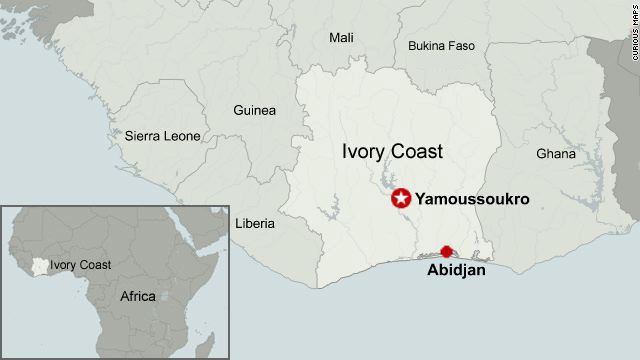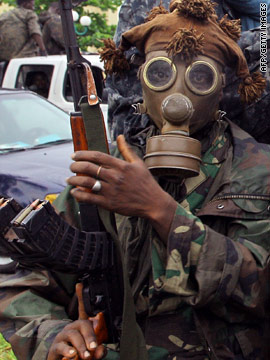U.N. forces fire on Gbagbo loyalists in the Ivory Coast
April 10, 2011 -- Updated 0048 GMT (0848 HKT)
Ivory Coast bitter battle
STORY HIGHLIGHTS
- NEW: Forces loyal to Laurent Gbagbo attack the Golf Hotel, a U.N. official says
- The French mission was to evacuate diplomatic staff in Abidjan
- French forces came under fire from Gbagbo loyalists
- Some semblance of normalcy is returning in Abidjan
(CNN) -- Forces loyal to self-declared Ivory Coast President Laurent Gbagbo attacked Saturday the Golf hotel in Abidjan, where Alassane Ouattara -- the internationally recognized president of the country -- is staying, a spokesman for the United Nations said.
U.N. forces fired back, said Hamadoun Toure, spokesman for the U.N. mission in the Ivory Coast.
"We stand ready to protect the Golf Hotel, as we have a mandate," he told CNN.
Toure added that Gbagbo loyalists continue to control three main areas -- the presidential palace, Gbagbo's residence and the state television station, RTI. He said the French military and U.N. forces are in charge of the Abidjan port.
Elsewhere on Saturday, French forces aborted a mission to evacuate diplomatic staff after drawing fire from forces loyal to Gbagbo, believed to have been all but defeated earlier in the week.
The evacuation was deemed too risky for those involved, said French Defense Ministry spokesman Col. Thierry Burkhard, who declined to comment on the nationality or location of the diplomats.





RELATED TOPICS
The French ambassador's residence came under fire Friday, according to Frederic Daguillon, commander of French forces in Ivory Coast. He reported rocket-propelled grenades and two mortar shells landing on the residence.
He said the fire came from positions held by Gbagbo's men, who appeared to be regaining ground.
"French helicopters opened fire in self-defense, they returned fire in self-defense and destroyed an armored vehicle," Daguillon said.
Meanwhile, efforts were underway to restore some semblance of normalcy in Abidjan, Ivory Coast's largest city.
Commercial flights resumed at the Abidjan airport Saturday and the port was reopened, Burkhard said. Crews were concentrating on restoring water and electricity to residents who have gone without for days after forces loyal to Ouattara entered the city last week.
Violence erupted after Ivory Coast's disputed presidential election in November and escalated into all-out war when Ouattara's forces launched an offensive that brought them into Abidjan.
Ouattara is the internationally recognized president of Ivory Coast. His rival, Gbagbo, has refused to cede power, the political stalemate plunging the West African nation into crisis.
Gbagbo's forces used a lull in fighting this week as a "trick" to reinforce their positions around the Abidjan, according to Alain Le Roy, the head of United Nations peacekeeping operations.
They said Tuesday they wanted a peaceful solution to the monthslong fighting but soon resumed shelling both the U.N. headquarters and the civilian population, Le Roy told reporters at the United Nations.
Since then, they have regained control of two central areas of Abidjan and fighting is continuing, Le Roy said Friday, after briefing the U.N. Security Council on developments in the cocoa-producing nation.
"They have clearly used the lull of Tuesday as a trick to reinforce their position," he said.
Most areas of the capital, however, are now under U.N. or French military control, journalist Seyi Rhodes reported from the French military base in Port Bouet. The French military has been working to reconnect the disrupted water and electricity supply in what is the country's main city.
On Saturday, Rhodes -- who was on patrol with the French military -- said he visited Cocody, an upscale suburb of Abidjan, where Gbagbo lives. Major evacuations were conducted there, he said, describing residents running with multiple pieces of Louis Vuitton luggage in tow.
Rhodes traveled with the French military through Abidjan on Friday and reported seeing civilians in the streets, including one woman selling food, which he took as a positive sign.
Pro-Gbagbo forces have heavy weapons including tanks, mortars and rocket-propelled grenades and are using them "as we speak, against the civilian population" and U.N. headquarters, Le Roy said.
"Those who are saying there are no more heavy weapons -- that Mr. Gbagbo has no more heavy weapons -- it's a lie," he said.
An Abidjan resident told CNN that people were now out and about on the streets but there were no public buses or taxis running. The resident said people were walking to markets and were able to buy food -- mainly rice.
CNN's Aliza Kassim contributed to this report (source: CNN)
=============================


No comments:
Post a Comment